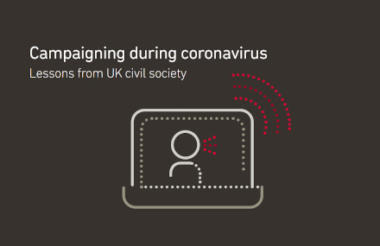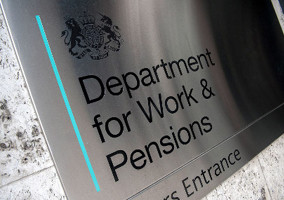The government became “increasingly hostile” towards campaigners over the course of the Covid-19 crisis, according to a coalition of charities.
Campaigners said that too many charities have been “shut out” by politicians and officials in recent months, despite civil society and government collaborating successfully earlier in the pandemic.
The coalition, which includes NCVO, ACEVO, Bond, Quakers in Britain, Unlock Democracy and the Sheila McKechnie Foundation, working with the Civil Society Voices network, published a paper Campaigning During Coronavirus today.
The charities have called on the government to agree a new framework with civil society, which recognises the value of independent campaigning and promises to safeguard legal rights to protest.
Collaboration between charities and government
The report said that “many campaigners, who were brought in by the government in the early days of the pandemic and made an invaluable contribution to the UK response, struggled to engage with the government in later months”.
It provides 10 examples of charity advocacy helping the government develop policies in response to Covid-19, including the creation of the furlough scheme, protecting people from being evicted from their homes, and helping victims of domestic abuse access support.
On furlough, the report said that the Trades Union Congress, working alongside business body the Confederation of British Industry (CBI), “went from formulating the proposal, to campaigning for it, to talking to the chancellor about it, to getting it, in around ten days”.
Another example was the cooperation between charities and Whitehall to meet growing demand for domestic abuse services during the pandemic. This led to the government providing around £30m in emergency funding to Women’s Aid, working in partnership across the sector, the report said, with another £12m in “top up funding” at the end of 2020.
“At first, women and other groups facing discrimination were largely invisible in the government’s Covid-19 response, and the lack of planning to mitigate risks to women and children experiencing violence and abuse was clear,” the report said.
“It took sustained campaigning and joint work with the whole [violence against women and girls] sector to ensure these issues received the attention needed.”
From engagement to hostility
These examples offer a “glimpse of what can be achieved when decision makers are open to engagement and work with campaigners rather than against them”, the report argues.
However, the report says that instead of building on these developments the government is planning measures that would make it harder for campaigners to engage with policy makers.
“The political and operating environment for campaigners has become increasingly hostile, as the government has once again moved to close the space for civil society,” the report says.
“Groups that played a crucial role in the early days of the pandemic no longer have the same access, while others continue to be shut out from the real and virtual corridors of power.”
The report explains: “Rather than recognising the important support campaigners provided in the pandemic response over the last year, the UK government is moving ahead with plans to place greater restrictions on the right to protest – as part of the Police, Crime, Sentencing and Courts Bill – and limit access to judicial review – an important check on the government.”
Reset
The coalition said that it was time for the government to “reset” its relationship with civil society.
The report argued that two pieces of upcoming legislation, to restrict rights to protest and limit the right to challenge government decisions in the courts, will further undermine campaigning.
It said: “As we enter the second year of the pandemic and begin thinking about life in the new normal, it is clear we need to build better ways of doing things which will deliver a more hopeful future.”
‘The power and benefit of campaigning’
Rowan Popplewell, the civic space policy manager at Bond, and one of the report’s authors, said: “From protecting millions of jobs in the UK to advocating for fairer access to vaccines globally, campaigners have ensured a more compassionate, inclusive and effective pandemic response.
“The pandemic revealed the power and benefit of campaigning.
“The political environment, as well as restrictive legal and regulations, continues to create barriers for campaigners seeking to deliver change for the people and issues they care about.
“As we enter the second year of the pandemic, we need to reset the relationship between campaigners and decision-makers and take steps to better protect the right to campaign.”
Related news













